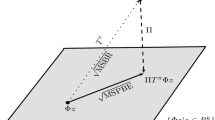Abstract
We consider the design and analysis of algorithms that learn from the consequences of their actions with the goal of maximizing their cumulative reward, when the consequence of a given action is felt immediately, and a linear function, which is unknown a priori, (approximately) relates a feature vector for each action/state pair to the (expected) associated reward. We focus on two cases, one in which a continuous-valued reward is (approximately) given by applying the unknown linear function, and another in which the probability of receiving the larger of binary-valued rewards is obtained. For these cases we provide bounds on the per-trial regret for our algorithms that go to zero as the number of trials approaches infinity. We also provide lower bounds that show that the rate of convergence is nearly optimal.
Similar content being viewed by others
Author information
Authors and Affiliations
Corresponding authors
Rights and permissions
About this article
Cite this article
Abe, N., Biermann, A. & Long, P. Reinforcement Learning with Immediate Rewards and Linear Hypotheses. Algorithmica 37, 263–293 (2003). https://doi.org/10.1007/s00453-003-1038-1
Received:
Revised:
Published:
Issue Date:
DOI: https://doi.org/10.1007/s00453-003-1038-1




